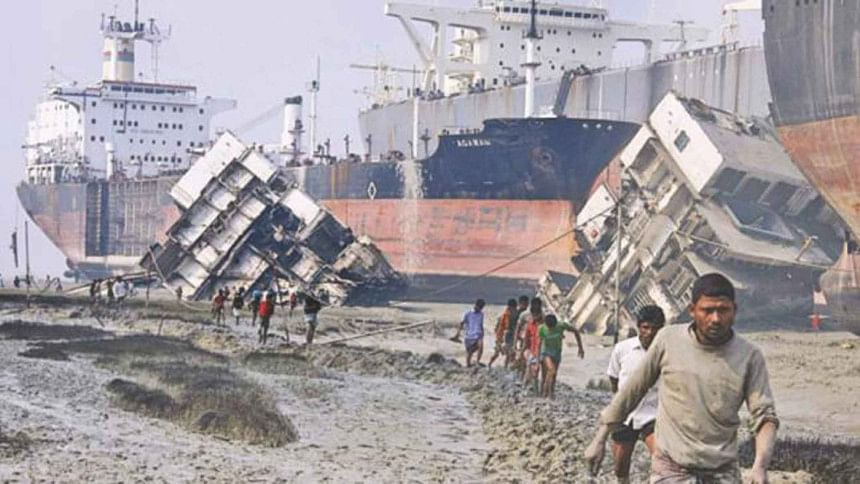Another death at a shipbreaking yard

We are appalled at the tragic and untimely death of a worker in one of Chattogram's shipbreaking yards. The foreman, Ripon Mia (37), died on the spot after iron sheets fell on him at Tasin Steel Shipbreaking Yard, a yard owned by a Chattogram-4 lawmaker.
Whenever a worker at a shipbreaking yard dies during duty—which happens far too frequently—the employers' first course of action is usually to try to evade responsibility and accountability. But while the owner of the yard in question had no qualms confirming the cause of Ripon's death, his disregard in saying that "sometimes incidents like this happen in spite of [owners'] efforts to save workers from accidents" is quite shocking. That the gruesome death of an employee (while he was on duty at midnight) should invoke such indifference is outrageous.
Besides incidents such as this, workers in the port city's shipbreaking yards are also injured or killed by inhaling toxic fumes, receiving burns, or even from explosions of oil tanks when working without proper (or any) safety gear on. Another example of how these workers' safety is not prioritised is that last year, the yards began reopening in April less than a month after they were shut down due to the coronavirus outbreak. Even then, there was not enough protective gear to protect the workers from the deadly virus.
In its guidelines for safety and health in shipbreaking in Asian countries, the International Labour Organisation (ILO) lists myriad safety precautions, including the wearing of appropriate PPE, which are hardly ever practiced in Chattogram's shipbreaking yards. Being in the informal sector, these yards are also not always subject to controls or inspections for proper health and safety measures. And with many of the workers being under the age of 18, these jobs would also violate the Minimum Age and Worst Forms of Child Labour Conventions of the ILO.
It is clear that Ripon's death is not an isolated event, and that it could well have occurred at any of the over 100 such shipbreaking yards in Chattogram, as none of them have ensured proper safety of their workers. Even more alarming is the non-existence of any action being taken against these yards. Although there were 181 such deaths between 2005 and 2017, and several more in the following years, not a single case has ever been filed against a yard owner in the history of this industry, according to the president of the Shipbreaking Trade Union Forum.
So who is to blame for these injuries and deaths? A letter from the Ministry of Industry (issued on December 30 last year) blames yard owners' apathy when it comes to ensuring a safe workplace for employees. But where can we find the empathy of the Ministry itself in mentioning that "accidents like this give a negative impression about the yards in the international arena" in the letter? Why is the perception of the international arena the only concern when we are discussing the safety of human lives?
While the owners of these yards are morally obligated to protect their employees from dangerous working conditions, we believe it is the responsibility of the Ministry of Industries (and others in charge) to make sure that visible and effective changes are made so that injuries and deaths at shipbreaking yards can be prevented.

 For all latest news, follow The Daily Star's Google News channel.
For all latest news, follow The Daily Star's Google News channel. 



Comments